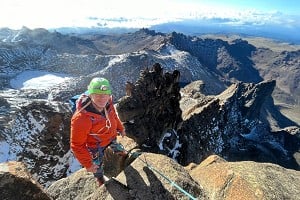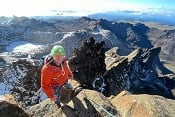In reply to MG:
> I am not sure how both the above statements can be true! But basically the latter is my experience at times with West Col guides, which I think is worth flagging up to people who may be planning to use them. My suggestion that the reason is they might have been written in holidays, rather than fully researched, was based in part on the text in the introduction of some of the guides.>
Yes - perhaps I was a little unclear. They can be true, and indeed are, because the second quoted sentence didn't refer to routes in West Col guides. But I agree; it probably didn't contribute much to trot out the "not a complaint I've heard before" comment, which could simply be due to a sheltered existence! My point, though - if a little obscured by enveloping rambling - was that the guides in question were written at a time when guidebook inaccuracy was not unheard of, across the board - West Col, Alpine Club, whoever; so any caution would more fairly cite old editions in general rather than any one publisher in particular. There is, of course, less reason to be using an old AC guide nowadays - at least to popular areas, which they mostly are; there's normally a much more recent version available, wherein the inaccuracies of earlier editions will have been rectified. This tends not to apply with West Col; in some cases their original edition or an early second edition remain the only climbing guidebooks to that area ever to have been published in English - so if that's what you're looking for it's probably your only option, hopefully supplemented by a modern locally-produced topo publication in its home language. In short - warning against an old guidebook because it happens to be from West Col appears somewhat unfair; any inaccuracy is quite likely to simply be due to its age.
I don't know whether the paragraph in the introduction to a 1969 edition matches any to which you refer, or indeed in any of the Tirol volumes that I've sourced:
"The author has spent several seasons in the area, doing most of the walks, classic routes and a number of extreme climbs. When it has not been possible to acquire personal knowledge, several local experts have been consulted for their views and opinions."
This seems pretty reasonable to me, and I would imagine was how most guidebook writers went about their task at the time. I don't, for instance, think it realistic to suggest that the writer should himself have climbed every route. In the introduction to his 1970 AC Dolomites editions John Brailsford acknowledged input from several other people, including heavy reliance on translations from Italian and German guidebooks. He also mentioned the 1968 ACG Bulletin containing a list of corrections to an earlier 1963 guide that had been sent in by climbers in the interim. That's very much a factor; guides tend to improve over the years with feedback and subsequent editions, and when visiting a less mainstream area it goes without saying that it's unlikely to be as well served with guidebooks - whether with respect to accuracy or mere availability - as somewhere with a higher demand. Modern first editions have, among other things, the example of a generally high current guidebook standard to live up to, so tend to be better than they might have been if produced several decades ago.
And, of course, you and Mr Purewater are quite right; it's certainly worth reminding people that an old guide to an area is probably not as reliable as a recent one - whatever language that might involve.









